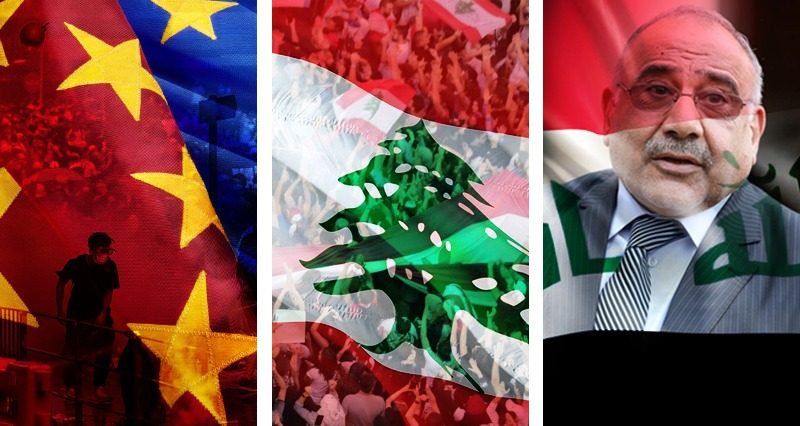Protests in the Shia crescent: Iraq, Iran and Lebanon
Several Middle Eastern Shia-majority countries have recently been rocked by mass protests. The protests which started in October in Iraq led to the resignation of the country’s PM, Adil Abdul-Mahdi.
The protesters demands include calling for new elections (to fight ‘corruption’) and the withdrawal of the Iranian influence on Iraq (Shia PM Abdul-Mahdi was seen as promoting and guiding Iranian influence in Iraq); Shia cleric Ali al-Sistani welcomed the resignation of Abdul-Mahdi. The protests were carefully coordinated through twitter: millions of publications with the hashtag #IraqiProtests and #العراق_ينتفض began spreading on Iraqi Twitter. There is a clear benefit for US in these protests: counter-acting Iranian influence in Iraq is a crucial step in the implementation of Washington’s broader anti-Iran strategy in the Middle East. Iran’s influence on Iraq has been growing steadily since the 2003 (after the American intervention the Shiite majority began to strengthen in the country with the overthrow of Saddam Hussein, who was a Sunni patron). The destabilization of Iraq will seriously weaken Iran, a country which as long been enemy #1 for the US elite and President Donald Trump.
Large protests are also taking place in Iran itself, predominantly over the rise in gasoline prices. The US reacted predictably and immediately: White House spokesman Stephanie Grisham said in a statement that the US supports Iranian people in their peaceful protests and condemns the use of force against demonstrators by the authorities. The spokesman of the Iranian Ministry of Foreign Affairs Abbas Mousavi said that he considers the US’ statement interference in the country’s affairs.
The protests in Lebanon, which started earlier in September, have already resulted in the resignation of the Lebanese Prime-Minister and can be interpreted as a trial run for the eventual elimination of Hezbollah (a major enemy of both Saudi Arabia, Israel and the US). The protests started after the declarations of the government about the rise of the taxes on WhatsApp calls and cigarettes. There was undoubtedly real internal motivation for the protests, such as the hard economic crisis facing the country and ethnic divisions within the government; but the anti-Hezbollah and anti-Amal line that has been pushed at the demonstrations seems to be an effort by the fifth column, which has a pro-US orientation, to play on the anger of people and to direct them toward their private agenda, corresponding with the US’ line of weakening the Shiite influence of the countries (Hezbollah is closely connected with Iran).
“Some protests have been financed by embassies and suspicious sides. Certain elements are seeking to stir political tensions in Lebanon in a bid to create a political vacuum in the country,” the general secretary of the Lebanese political and paramilitary party Hezbollah Nasrallah said on Friday, warning that certain factions seek to lead the country into a “civil war”, a reference to the country’s bloody 1975-1990 civil war.
The United States is interfering with Hong Kong
This week, the US and China have reached a new level of hostility. US President Donald Trump signed two bills that have caused anger among the leadership of Hong Kong and China.
The first document stipulates that the State Department must confirm to Congress at least once a year that Hong Kong retains sufficient autonomy, has preferential terms for trade with the United States and that human rights are respected there. Washington could impose sanctions if they feel their demands have not been met.
The second bill aims to restrict the actions of Hong Kong police by prohibiting the supply of crowd control tools to Hong Kong that can be used to disperse demonstrations, such as tear gas, pepper spray, rubber bullets and stun guns.
China was outraged by the bills and strongly protested the ongoing interference in the country’s internal affairs.
The protests in Hong Kong have been going on for several months now and have become more fierce day by day. Read more about the situation here.
New leadership in the European Union
On December 1, the newly elected leadership of the European Union started work. The politicians took part in a solemn ceremony in Brussels on the occasion of the 10th anniversary of the Lisbon Treaty.
Former German Defence Minister Ursula von der Leyen officially took office as head of the European Commission. Former Belgian Prime Minister Charles Michel began his work as President of the European Council.
Due to the conflict in the EU, the ceremony had been postponed for a month – this was primarily the result of blocking of the EU commissioners from Romania, France and Hungary being blocked.









Leave a Reply